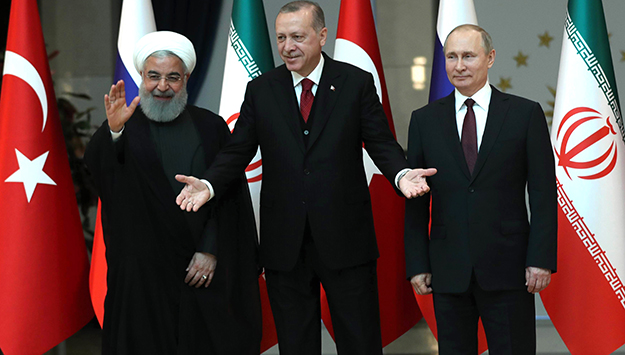Just last week, Turkey's President Recep Tayyip Erdogan hosted his Russian and Iranian counterparts in Ankara for talks to end the Syrian civil war. The summit of the three leaders was a strong display of unity against a backdrop of rising tensions between them and the United States. The underlying message was that the three countries were calling the shots in Syria, and that President Donald Trump’s announcement that the U.S. would be pulling out soon was right on the spot.
Despite the images of warm handshakes, however, signs of tension remain. Iran’s President Hassan Rouhani told Turkey during the summit that the Syrian region of Afrin, captured by Turkish forces and their Syrian rebel allies, should be handed over to Syrian government forces. Russia, which initially greenlighted Turkey’s operation in Afrin, followed suit. Russian Foreign Minister Sergey Lavrov has said that Russia expects Turkey to bring the town under the control of the Syrian government. These statements should give Turkey pause. While Turkish officials welcomed Trump’s announcement that the U.S. would withdraw from Syria “very soon,” such a withdrawal would leave Turkey even more vulnerable vis-a-vis Iran and Russia.
Turkey was able to launch the military incursion into the Kurdish enclave of Afrin thanks to Russia. Moscow has a military base there and controls the skies over the region. After turning a blind eye to Turkey’s request to capture the Kurdish-majority town for over a year, Moscow finally agreed. It was the U.S. announcement that it would establish a “border force” to defend territory held by U.S.-backed, Kurdish-led fighters in northern Syria that prompted the Russian decision. Russia viewed the Turkish incursion as a way to weaken the U.S.’s Kurdish allies and curb U.S. influence in Syria. Iran, which was equally alarmed by the prospect of a long-term U.S. presence in Syria, acquiesced to Turkey’s move.
Trump has reportedly agreed to not pull U.S. troops out of Syria until ISIS is defeated, but with daily contradictory statements coming out of Washington, U.S. allies in the region are still nervous. Not Turkey. Ankara is thrilled that the U.S. might withdraw from Syria soon, thinking that it would end the U.S.’s partnership with the Syrian Kurdish group the People’s Protection Units, also known as the YPG, and remove a major foreign policy headache for Turkey. But it will create new and potentially more challenging ones.
If the U.S. is out of the picture in Syria, both Russia and Iran will be less sympathetic to Turkey’s efforts to contain the YPG. Russia has long argued that the Kurds’ interests must be taken into consideration in the political settlement of the Syrian civil war. However, the prospect of a long-term U.S. presence in Syria and the struggle between Washington and Moscow to pull the Kurds away from each other’s orbit has ultimately aligned Russia’s YPG strategy with that of Turkey. The U.S. factor played a similar role in Iran’s acquiescence to Turkey’s military operation in Afrin. If the U.S. pulls out, the Kurds are likely to move closer to Russia, leaving Turkey even more vulnerable to Moscow’s Kurdish policy.
The recent statements from Russia and Iran calling on Turkey to hand over Afrin to the regime should be a reminder to Ankara of the risks of putting all its eggs in the Russian basket. An American official once told me about a tense conversation between Turkish and American officials regarding the YPG. The U.S. side told the Turks that the Kurds would always be under someone’s control and that it was better for Ankara if that someone was the U.S. rather than Russia. The Turks rebuffed the idea at the time but they may find out soon that it might not be as wild as they thought.
Photo: TOLGA BOZOGLU/AFP/Getty Images


